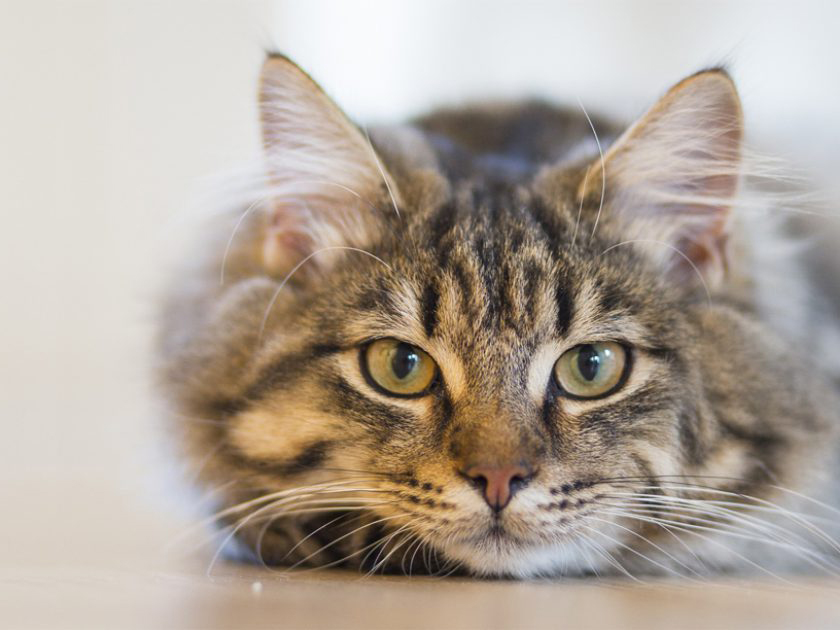Preparing Your Cat For A Visit To The Veterinarian

As every cat owner knows, taking your feline friend to visit the veterinarian can be a challenge, but regular veterinary check-ups are one of the most important things you can do to keep your cat happy and healthy.
To help make this process less stressful for both you and your cat, Paula Plummer, a surgical oncology technician at the Texas A&M College of Veterinary Medicine and Biomedical Sciences’ Veterinary Medical Teaching Hospital, offers some tips on preparing for a visit to the veterinarian.
One of the first questions pet owners have is how often should they take their cat to their veterinarian.
“As kittens, they will need checkups monthly as they go through their kitten vaccine series,” Plummer said. “As your cat matures, a visit may only be required yearly. Your veterinarian may change their recommendations depending on the needs of your cat, so it is best to follow their advice.”
Whether you are taking a new kitten to its first appointment or checking on an older cat’s health, it is helpful to create a list of questions ahead of time so nothing is forgotten during the appointment.
“If you’re seeking veterinary attention because you have adopted a new kitten, you should ask about nutrition, environmental enrichment, vaccines, flea/tick/heartworm/parasite prevention, and general care information,” Plummer said. “If you are seeking veterinary attention for a cat’s medical condition, ask about that condition, specifically; medications; treatment options; and any lifestyle changes that may occur.”
If you are taking your pet to a new veterinarian for the first time, it is important to provide the doctor with a complete record of your cat’s medical history.
Past medical can either be brought with you or emailed to your veterinarian in advance. These records can include, but are not limited to, current medications, radiographs and other imaging, lab work, and test results. For newly adopted kittens, owners should bring along any paperwork they received from the adoption.
Having a good understanding of the brands of food your cat eats, along with how much, will also help your veterinarian get acquainted with your animal.
For cats, the hardest part of a visit to the veterinarian may not occur in the hospital at all but, rather, in the car ride there. For cats with little experience riding in vehicles, a long car ride has the potential to cause a great deal of stress. To help ease car ride anxieties, Plummer recommends carrier training as early as kitten stage.
“When choosing a cat carrier, please be thoughtful of the veterinary team and their ability to safely remove your beloved feline family member from it when at the hospital,” Plummer said. “The safest carrier for both your cat and the team is a hard sided carrier with a soft, cozy bed in it.”
To help your cat become familiar with the carrier, Plummer suggests “leaving the carrier out in the house to allow your pet to get used to it.”
Because cats are sensitive to smell, if there is still a hesitancy when approaching a carrier, owners may try incorporating comforting scents to help provide a sense of familiarity. This can include using old bedding or clothing covered in their owner’s scent inside the carrier or spraying a synthetic feline pheromone on and around the carrier.
Above all else, car owners should remember that a veterinarian who personally knows your animal will provide the best advice for dealing with travel-related anxieties.
Veterinarians and their support staff work to understand each and every cat’s individual needs through interpreting their body language and facial reactions,” Plummer said. “Being able to assess a cat’s anxiety levels allows staff members to help ease the stress of veterinary check up and make the experience enjoyable for both the owner and their cat.
Because of this “it is always best if you seek veterinary advice for specific r4ecommendations on easing anxieties for you and your beloved feline family member,” she said.
Learning to care for our feline friends starts with routine veterinary visits to ensure your cat’s individual health needs are being met. By being mindful of a cat’s anxiety levels and comfort zones, owners can help transform a potentially anxiety ridden check-up into a stress free adventure.
Pet Talk is a service of the College of Veterinary Medicine & Biomedical Sciences, Texas A&M University. Stories can be viewed on the web at vetmed.tamu.edu/news/pet-talk. Suggestions for future topics may be directed to vmbs-editor@tamu.edu.


